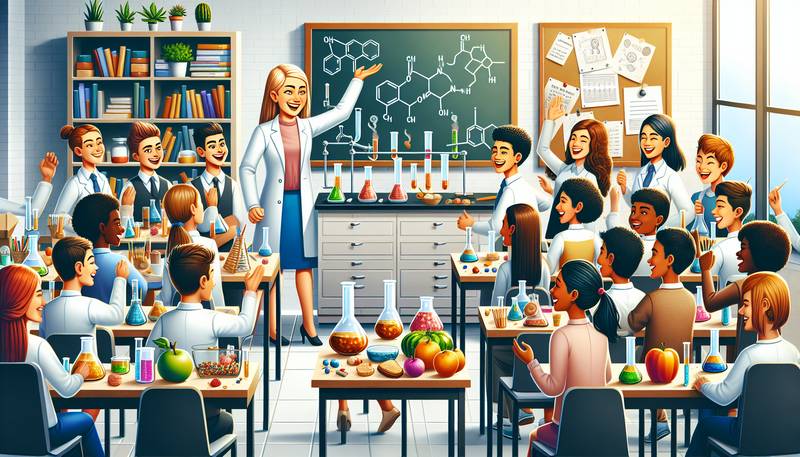Teaching Chemistry Through Edible Experiments

The Science of DeliciousnessWhen I was a kid, "Chemistry" was a subject that struck dread into the hearts of many students, myself included. It was as if the teacher took malicious glee in tormenting us with endless equations and chemical reactions that would probably never matter in our adult lives. However, I'm here to tell you that it doesn't have to be that way. Chemistry can be fun, engaging, and even delicious (no, really!) when you incorporate edible experiments into your teaching repertoire. Just don't tell my old Chemistry teacher – he might feel regret for not making his class more appetizing.Why Teach Chemistry with Edible Experiments?Using food as a vehicle for teaching Chemistry can do wonders for student engagement. After all, everyone eats, and many people enjoy cooking or baking. Plus, you'll be hard-pressed to find a person who doesn't appreciate the occasional sweet treat. Edible experiments allow students to see chemistry in action and better understand the underlying principles of the subject. As they watch their concoctions change in color, texture, or taste, they'll be able to connect the dots between science and real-life applications. And, of course, when the experiment is over, they get to eat their results, which never hurts in terms of motivation.Edible Experiments: From Acid-Base Reactions to Molecular GastronomyThere are endless possibilities when it comes to teaching Chemistry through edible experiments. In fact, much of what we know about cooking has a direct link to chemical principles. Here are a few examples of lessons that can be easily adapted for classroom use:- Acid-Base Reactions: Baking soda and vinegar volcanoes may be a staple of elementary school science, but there are more delicious ways to teach students about acid-base reactions. Have your students make some "fizzy lemonade" by mixing lemon juice (citric acid) with baking soda (a base). They'll observe the carbon dioxide bubbles that form as the acid and base react, and then they'll get to enjoy a refreshing (and educational) drink.
- Crystallization: Rock candy is a classic example of sugar crystallization, and it's a fun (if slightly time-consuming) experiment for students to try. They'll learn about supersaturation, as well as the role of temperature in the crystallization process. Plus, the end product is pretty sweet, both literally and figuratively.
- Protein Denaturation: Teach your students about the denaturing of proteins by having them make a simple egg-based dish, such as scrambled eggs or a soufflé. As they cook the eggs, students can observe how the proteins change their structure and form new bonds, resulting in a completely different texture and appearance.
- Molecular Gastronomy: For a more cutting-edge approach, have your students experiment with molecular gastronomy techniques, such as spherification or foam-making. This contemporary culinary movement incorporates principles from physics and Chemistry to create innovative dishes that challenge conventional ideas of what food should look, feel, and taste like. Students will love the opportunity to play with their food, and they'll learn about chemistry concepts like viscosity, emulsification, and gelation in the process.
Teaching Tips and TricksWhile edible experiments can be an effective way to teach Chemistry, there are some challenges and potential pitfalls to consider. Here are a few tips to help you make the most of your food-based lessons:- Safety First: Remind your students that although these experiments involve food, they still need to practice proper lab safety. This includes wearing safety goggles and gloves, tying back long hair, and avoiding tasting anything without explicit permission from the instructor.
- Plan Ahead: Many edible experiments require specific ingredients or equipment (such as a stove or oven), so make sure you have everything you need before starting the lesson. In addition, some experiments may take longer than a single class period to complete, so plan your schedule accordingly.
- Adapt to Your Audience: Depending on the age and skill level of your students, you may need to modify your lesson plans to ensure that the experiments are both safe and engaging. Don't be afraid to adjust the difficulty level or swap out ingredients to better suit your students' needs.
- Emphasize the Chemistry: While it's fun to get creative with cooking and baking, don't lose sight of the educational goal. Make sure your students understand the underlying chemical principles at work in each experiment, and encourage them to think critically about how these principles apply to other aspects of their lives.
Teaching Chemistry through edible experiments can be a fun and effective way to engage students in the subject. By using food as a teaching tool, you'll not only foster a greater appreciation for Chemistry but also create memories that will last a lifetime. And who knows – you may even inspire the next generation of chemists (or chefs) in the process.
|
|







